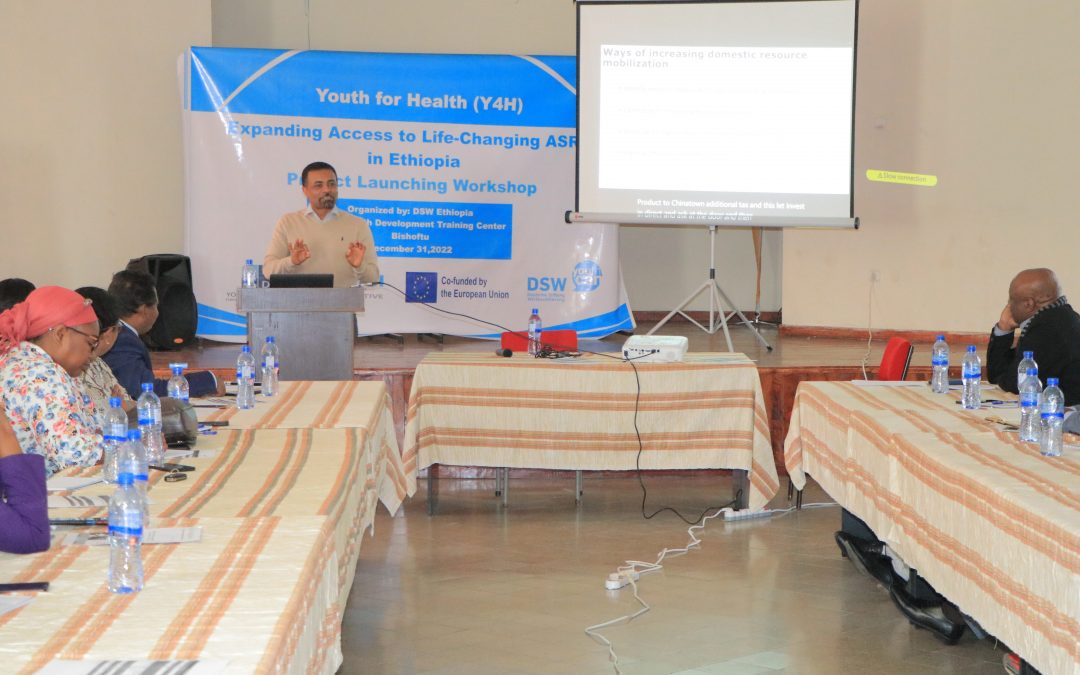Expanding access to high-quality Adolescent Sexual & Reproductive Health (ASRH) information and services, including safe abortion (SA) and post-abortion care (PAC), is essential for adolescents’ health and wellbeing, and to prevent unintended pregnancies and sexually transmitted infection (STI) transmission, including, human immunodeficiency virus (HIV) infection.
On December 31, 2022, the launch and planning meeting of the “Youth for Health/Expanding Access to Life-Changing ASRH in Ethiopia” project was held in the presence of members of the Ethiopian Parliament office. This project is going to be implemented under the leadership of DSW Ethiopia, MSI Ethiopia and Youth Network for Sustainable Development (YSDN). DSW will covers two regions in Ethiopia – SNNP and Oromia. Youth will be directly addressed in these two regions. In addition to the Federal Democratic Republic of Ethiopia, this project, funded by the European Union, is going to be implemented in Ghana, Kenya, Sierra Leone, Tanzania, and Zambia.
For the launch programme, which took place at DSW’s youth development training center in Bishoftu city, key stakeholders from different ministries, House of people’s representative office, CSO Consortiums, implementing partners, representative regional and district officials and youth organisations and youth representatives and other relevant bodies were present.
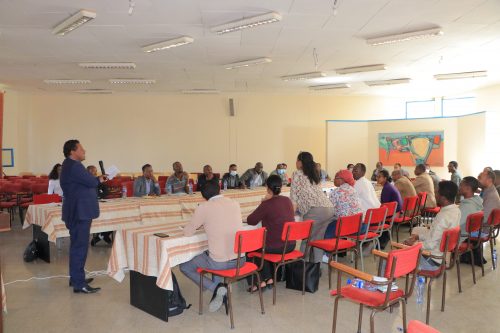
Advocacy interventions for domestic resource mobilisation (DRM), policy change, integration of SRHR into national health strategies and sub-national policies and budgets, availability of SRH supplies, and youth-friendly services will contribute to a legal, political and social environment that allows adolescents, especially girls and vulnerable adolescents, to access the quality and age-appropriate ASRH services they need. While welcoming the participants, Mr. Feyera Assefa, Country Director of DSW Ethiopia, said, “The project, Expanding Access to Life-Changing ASRH in Ethiopia, will be implemented by DSW and two other partner organisations for three consecutive years. In doing so, DSW is accountable to attain the end result of “Improved enabling policy and funding environment at regional, national and sub-national level supporting the fulfillment of ASRHR”.”
As declared within the launch programme of this project, the other executor of the project, MSI Ethiopia, will work to achieve an outcome of “Increased public sector willingness and capacity to deliver and sustain high-quality ASRHR information and services for the poorest and most marginalized adolescents in rural and hard-to-reach areas “. The third project implementer, Youth Network for Sustainable Development (YSDN) will work to attain an outcome of “Increased demand for, and access to, high-quality and discrimination-free ASRHR information and services with a focus on reaching the poorest and most marginalized adolescents in rural and hard-to-reach areas”. Mr. Assefa said, “DSW will work in collaboration with implementing partners and signatories to achieve the fruitful outcomes of this project.”
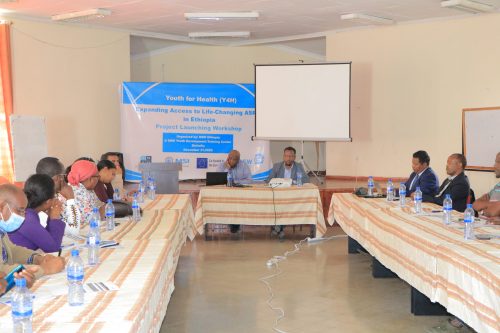
One of the points raised during the opening remarks of Mr. Habtamu Getachew, from the Ministry of Plan & Development, was the challenges that prevent young people from easily accessing reproductive health services. Inadequacy of health facilities that give youth-friendly services (YFS), shortage of supplies and lack of resources allotted to AYSRH were cited as major challenges. Mr. Getachew said “this project will contribute to the allocation of resources and create an enabling environment for AYSRH services”.
In this project’s launching programme, studies and experience that would be useful resources for the implementation and execution of the project were presented. Among the research papers presented was Dr. Girmaye Dinsa’s research explaining how to allocate domestic resources and expenditure for the ASRH Programme in Ethiopia. Allocation and efficient use of resources and areas for domestic resource mobilisation were key points of the presentation. Dr. Dinsa aforesaid in his presentation, “In order to allot ample resources for adolescent and youth sexual and reproductive health (AYSRH) and expand the access to services, an evidence-based multi-layer advocacy work should be done to coordinate all the financial support providers.”
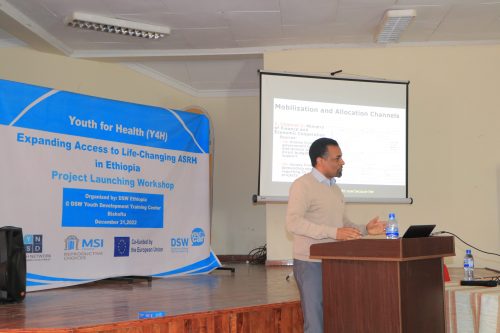
Dr Dinsa presenting at the Y4H Launching Workshop
According to Dr. Dinsa’s presentation, the possible channels for resource mobilisation and allocation are presented as follows; the Ministry of Finance and Economic Cooperation, the Ministry of Health and non-governmental organisations.
Dr. Dinsa also presented the resource need for family planning. Accordingly, the cost of providing Family Planning (FP) was estimated to be ETB 5.6 billion per year between 2016 and 2020, the cost of FP accounted for about 64 percent of the total cost of all exempted services. And these figures could be higher for the 2021 to 2025 period.
In addition, an overview and key activities of the project were presented by DSW Advocacy and Partnerships Manager, Mrs. Tsige Gebretsadik. In her presentation Mrs. Gebretsadik said “Effective resource mobilisation is critical for the future sustainability of AYSRH programming. And this often starts with multi-layer advocacy efforts for increasing a budget for AYSRH.”
The panel discussion reflected ideas that will be used as input for this project’s implementation in the next three years. During this discussion, value-adding ideas were reflected by the participants that could make the implementation of the project successful. Participants highlighted the importance of considering existing youth organisational structures when selecting youth champions, budget calendar for budget advocacy and key areas for domestic resource mobilisation.
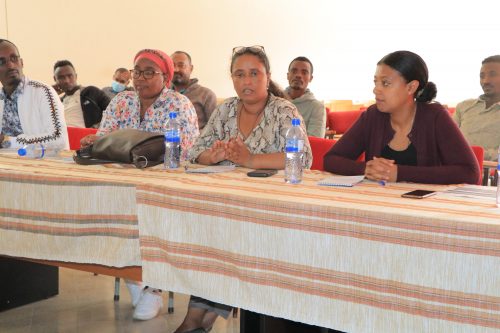
Mrs. Teje (middle) from the Ethiopian Parlament
In the closing remark, Honorable Mrs. Teje, a member of the Ethiopian People’s House of Representatives office, said, ” ensuring youth engagement in domestic resource mobilization will play a significant role in expanding sustainable and effective AYSRH services.” Mrs. Teje said, “The work we do on the youth mainly requires the engagement of the youth themselves. This will lead to the sustainability and effectiveness of projects and reduce the health problems of the youth.” Mrs. Teje, in her concluding remark shared her opinion as an additional comment that the project could reach all parts of Ethiopia. And finally, she promised her readiness to contribute to the success of this project by being personally involved in the implementation when necessary, advising, and consultation.
Key sectors and stakeholders who will be involved in the implementation of the project as steering committee at national level and project support committee at district level were identified by the participants.
Photos: private
